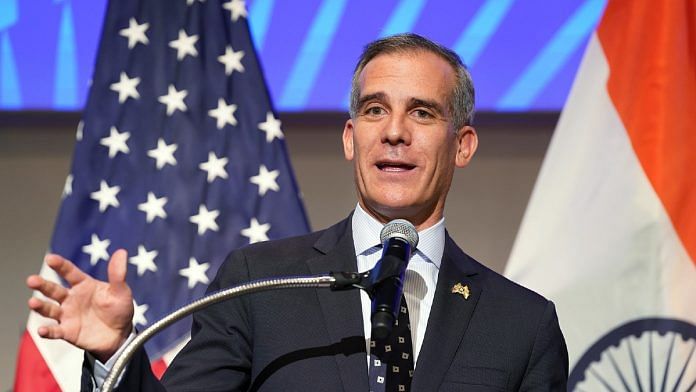New Delhi: India and the US can jointly deploy ships and air forces in the Indo-Pacific “to ensure freedom of the skies and seas”, US Ambassador to India Eric Garcetti said Wednesday.
While delivering a speech at the Indian Institute of Technology (IIT) in Delhi, he said: “We can deploy our ships together in the Pacific and Indian oceans…to ensure maritime security…We can employ our air forces across the Indo-Pacific region…”
The American diplomat also suggested that the two countries coordinate land-force exercises across regions and increase interoperability between their forces.
“We need to institutionalise trust by increasing our human interaction, communication, and interoperability between our forces,” he said.
Garcetti called for further military co-production between New Delhi and Washington, citing existing collaboration in the field of engineering and planned projects in aero engine, artillery and ground vehicle sectors.
His remarks come days after Prime Minister Narendra Modi’s visit to the US, during which the two countries agreed to a $3 billion drone deal which includes a purchase by India of 15 US-made Sea Guardian drones.
The Indian Navy leased two of these drones in November 2020, shortly after Indian troops clashed with Chinese soldiers at the Galwan border that year. Apart from the 15 new Sea Guardian drones, India is seeking to extend the lease of two such drones stationed at a naval base in Tamil Nadu, which is set to expire in 2024.
Garcetti also remarked that India and the US are now “putting old trade fights in the rear view mirror”.
Last week, after Modi’s US visit, the two countries agreed to terminate six outstanding disputes at the World Trade Organization (WTO) and India decided to remove tariffs on 28 US goods.
Also Read: Why a confident Modi government took on Obama. It’s called leverage
‘Jet engine deal not just a strategic bet’
In conversation with C Raja Mohan, senior fellow with the Asia Society Policy Institute in Delhi, the US ambassador emphasised the importance of the jet engine manufacture deal signed with India last week.
Mohan remarked that the idea of using American technology to help India progress is finally being “realised”, but asked how the two countries plan to cement their ambitious agenda for their bilateral relationship.
In response, Garcetti cited the Initiative on Critical and Emerging Technology (iCET) and the jet engine deal as examples.
“I hope people see the GE engine deal not as some sort of bet or strategic call, but fundamental trust. Because we’re leading you with technology more than we have even with some of our closest allies,” said Garcetti.
According to the deal, General Electric (GE) will transfer critical jet engine technologies to Hindustan Aeronautics Limited (HAL) and help manufacture GE’s F414 engine for India’s indigenous Light Combat Aircraft (LCA) Tejas Mk2.
“You don’t do that on a strategic bet. You do that based on a relationship and friendship that isn’t hot-and-cold. That’s saying — ‘we’re going to be friends for the next 25-50 years’,” he added.
The GE deal could help India become militarily self-reliant. So far, only the US, Russia, the UK and France have the expertise to develop their own jet engines.
Fighting the ‘might is right’ mentality
During his speech at IIT, the US ambassador did not explicitly mention China as a challenge for India and the US, but made several veiled references to the country, especially while talking about the security of the Indo-Pacific.
“We live in a world in which countries ignore sovereign borders, advancing their claims through violence and destruction…India and the United States of America can build a bulwark against this ‘might makes right’ mentality,” he said.
On Monday, two days after Modi concluded his US visit, Chinese Foreign Ministry spokesperson Mao Ning had said at a media briefing in Beijing that military cooperation between countries should not “target any third party”.
“Military cooperation between states should not undermine regional peace and stability, target any third party, or even harm the interests of any third party,” she had said.
(Edited by Gitanjali Das)
Also Read: Modi’s US visit is everything China hates. It even called Biden’s optimism ‘wishful thinking’



